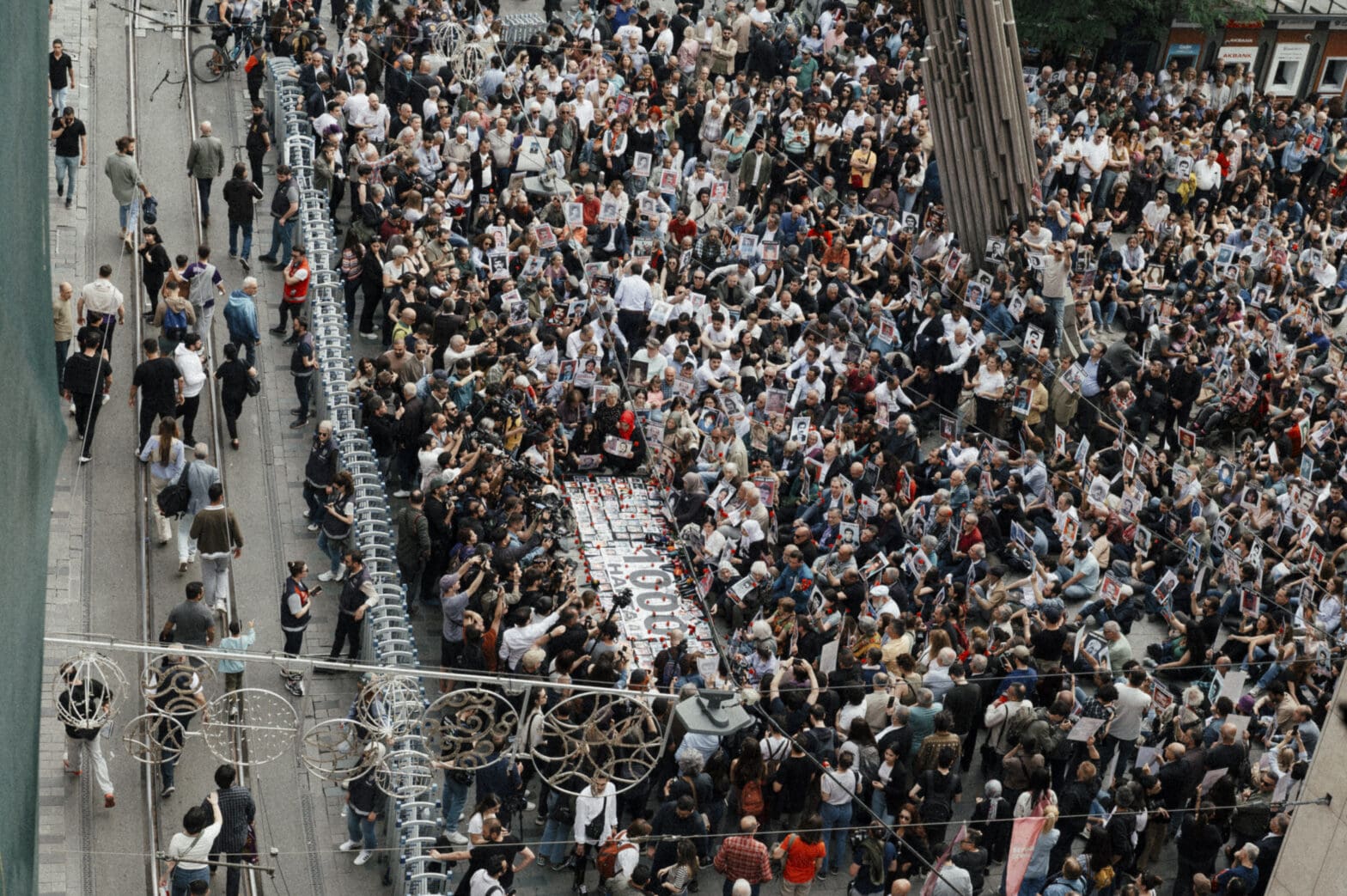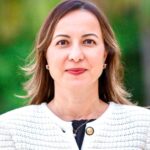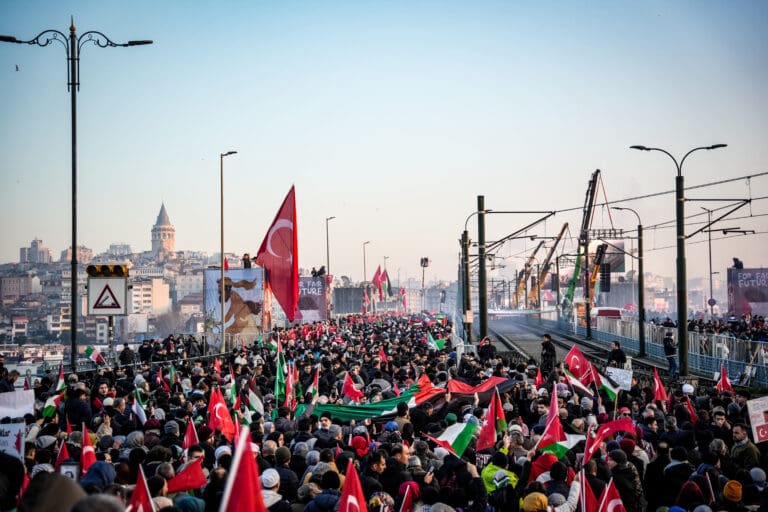
The Kurdish Issue Revisited:
Türkiye’s Complex Road to Peace
Policy Note, November 2024
Devlet Bahçeli, leader of the Nationalist Movement Party (MHP), a political party deeply rooted in Turkish nationalism, recently made a groundbreaking call to invite Abdullah Öcalan, the imprisoned leader of the Kurdistan Workers’ Party (PKK), to address Türkiye’s parliament. This move marks a significant shift in the country’s approach to the 40-year conflict. On October 22, 2024, Bahçeli urged parliament to allow Öcalan to “unilaterally declare that terrorism is over and his organization dissolved.”1 He also referenced the principle of the European Convention on Human Rights (ECHR) regarding the “right to hope,”2 advocating for the release of individuals who, like Öcalan, have served a maximum of 25 years.
While the initiative is unlikely to yield immediate results, it holds the potential for meaningful medium- and long-term progress if the Turkish government articulates a clear vision, outlines actionable steps, and manages the process inclusively with public engagement. Achieving success will also depend on building a resilient coalition to address challenges posed by domestic and regional spoilers. A successful peace process could resolve internal tensions, strengthen Türkiye’s regional role, drive economic growth, and enhance diplomacy.
This proposal to grant parole to Öcalan, though unexpected, comes at a time when Türkiye’s internal and regional landscapes have evolved considerably since the last peace process collapsed in 2015.3 In a notable shift from his party’s traditional hardline nationalist stance, Bahçeli’s proposal garnered support from President Recep Tayyip Erdoğan—although this time, the roles are different. In the previous process, Erdoğan assumed the heavy political burden of negotiation, stating he would swallow “hemlock poison” if it meant peace.4 Now, Bahçeli has put his full political weight and his close association with the state and its bureaucracy behind the move, aiming to make the proposal more palatable to the broader population.
The 2013-2015 Solution Process faced significant opposition and skepticism, especially from the opposition, largely due to Türkiye’s polarized society and the fact that Erdoğan led the initiative. In contrast, the latest initiative has received broader support from across the political spectrum, as it is perceived as a state-driven effort this time. Most notably, Özgür Özel, the new leader of the main secular opposition Republican People’s Party (CHP), has endorsed the call, emphasizing the importance of parliamentary involvement.5 This broader political backing creates a more conducive environment for the government to pursue the process in earnest.
Bahçeli’s call, backed by Erdoğan, appears less impulsive and more reflective of a broader state strategy aimed at preemptively positioning Türkiye amid shifting geopolitical dynamics. This unfolds against a backdrop of escalating Israeli actions in Palestine and Lebanon since October 7, 2023, raising regional tensions and the risk of broader confrontation potentially involving Iran. The change of leadership in Washington also introduces volatility that could impact the United States’ (U.S.) alliance with PKK-affiliated groups in Syria.
In this context, the new approach seeks to reassure nationalist factions within the state and society that the process is firmly controlled by the Turkish state, thereby mitigating any potential backlash. At the same time, it reflects Erdoğan’s delicate balancing act between addressing nationalist sentiments and attempting to explore renewed dialogue with the Kurdish community, with which he has largely lost connection. However, the depth of alignment between Erdoğan and Bahçeli on the issue remains unclear, adding another layer of complexity to the evolving process.
Complicating matters further, Bahçeli’s call has coincided with intensified actions by Turkish authorities against mayors from the CHP and the pro-Kurdish Peoples’ Equality and Democracy (DEM) party over alleged links to the PKK. On October 30, 2024, Ahmet Özer, the CHP mayor of Istanbul’s Esenyurt district, was detained.6 Days later, three pro-Kurdish mayors in Mardin, Batman, and Halfeti were removed over terrorism-related charges and replaced with state-appointed trustees.7 Critics argued that these actions undermine democracy and suppress opposition, while the government defends them as necessary steps in its fight against the PKK.
The key question is whether actions like judicial measures against elected mayors and the nationalist framing of peace efforts will derail the processes of genuine conflict resolution or democratization. Does this mix of pressure and controlled dialogue risk eroding trust and worsening tensions, or can it pave the way for a sustainable resolution to Türkiye’s Kurdish question?
Behind the “Surprise” Step
Traditionally opposed to any perceived concessions to the PKK, Bahçeli’s call for Öcalan to address the parliament appears to be a calculated political maneuver to address the Kurdish issue through a nationalist lens and a pragmatic approach aimed at stability in a region marked by war and conflict. His call outlined a process that is palatable to nationalist voters—one where the Turkish state remains firmly in control, under terms set by the nationalist alliance rather than by Kurdish political and cultural demands. By allowing Bahçeli to spearhead the initiative, Erdoğan positioned the call as a security-driven measure, ensuring that it aligns with the nationalist base of the Justice and Development Party (AKP)—a subtle yet critical framing. The strategy is thus removed from traditional liberal solutions such as creating a supportive base for democratization.
Bahçeli, acting as the state’s spokesperson, framed this initiative as a “counterterrorism” effort, contrasting the lessons learned from prior processes, such as when the PKK expanded its urban presence during negotiations between 2013-2015,8 in what was perceived as a severe lapse in security. Spearheaded by the AKP with Öcalan’s support, that “Solution Process” initially showed promise through ceasefire, secret negotiations, public gestures like the reading of Öcalan’s letters at Newroz celebration9, and periodic visits by Kurdish political actors to Öcalan. Despite its three-stage framework—ceasefire, democratization, and return/reintegration—the process collapsed due to political instability, missteps by both sides, and the destabilizing effects of the Syrian civil war.
As Syrian Kurdish groups gained power and de facto autonomy along Türkiye’s borders, this amplified Ankara’s security concerns and prompted a shift to a securitized, hardline approach. The process was criticized for its opacity and limited parliamentary engagement. Its eventual collapse prompted Ankara to shift focus, prioritizing efforts to limit the PKK-linked groups’ influence in Syria, carrying out widespread arrests of pro-Kurdish politicians and expanding operations in southeastern Türkiye, northern Syria, and northern Iraq. This pivot left the Kurdish question unresolved and reinforced the AKP’s alliance with the MHP; yet, electorally, it led to a weaker AKP.
For now, Türkiye’s revisited approach to the Kurdish question appears driven by strategies that serve immediate state interests. Any substantial outcomes from the “Bahçeli initiative” will likely emerge in the medium- to long-term. This includes decisions regarding the potential release of high-profile Kurdish political actors, such as Selahattin Demirtaş, whose fate seems contingent on shifting political calculations.10
For Bahçeli, engaging with Öcalan is strategically simpler than addressing broader Kurdish cultural and political demands, which would require navigating a more complex landscape and potentially unsettling nationalist support.
For Erdoğan, revisiting the peace process with the PKK may present a strategic opportunity. Kurdish political backing could be pivotal in any constitutional referendum, positioning Kurdish forces as potential kingmakers in Türkiye’s political landscape. If Erdoğan is determined to remain in power, he will need to amend the constitution to allow for an additional term—something that could be achieved with the support of Kurdish voters, who hold significant sway in elections and referenda, as evidenced by the recent general and municipal elections.11 Consequently, Erdoğan has much at stake in the process, as his political future hinges on maintaining his party’s majority support—a position he has held since 2002 as leader of the AKP. By contrast, Bahçeli and his MHP derive their strength less from the popular vote and more from their nationalist, statist ideology that aligns closely with the state bureaucracy—as well as their strategic alliance with Erdoğan’s government. In the 2023 general elections, the MHP’s voter base constituted around 10%, securing 50 parliamentary seats compared to the AKP’s 268 (out of a total of 600).12
Drivers and Barriers
Even as Bahçeli made his unexpected call for Öcalan to speak in parliament, captured public attention, a violent incident served as a stark reminder of the persistent volatility surrounding the Kurdish issue. On October 23, 2024, one day after Bahçeli made his statement, an attack in Ankara, attributed to PKK-linked armed factions, targeted Turkish Aerospace Industries and killed five people.13 The incident amplified nationalist sentiment and deepened the mistrust between the state and Kurdish insurgents. While it was likely planned before Bahçeli’s call, it was interpreted as a spoiler of peace efforts. Türkiye responded with swift airstrikes on PKK strongholds in northern Iraq and Syria, underlining Ankara’s readiness to pursue a hardline approach should the situation deteriorate.14 This violence, while threatening the peace initiative, also highlights the need for a resilient, sustained process.
The day after Bahçeli’s speech, Öcalan received his first family visit in four years, during which he indicated his willingness to support a transition from armed conflict to a political resolution if certain conditions are met.15 However, the PKK remains hesitant about disarmament. Statements from its military leaders were filled with caveats rather than firm commitments, asserting the PKK’s resilience while signaling a limited appetite to make immediate concessions.16 This stance complicates any solution centered solely on Öcalan, as some armed factions in the Qandil mountains—home to the PKK’s operational and ideological leadership—may resist a resolution without assurances of an “honorable exit”.17
Also speaking from prison, former co-chair of the Peoples’ Democratic Party (HDP) Selahattin Demirtaş advocated for a broader peace rooted in democratic values and inclusivity, appealing to many Kurdish citizens and left-leaning groups who seek structural reforms beyond mere disarmament. Tülay Hatimoğulları, the co-leader of the DEM party, expressed guarded optimism, calling the proposal significant but emphasizing the need for democratic negotiations rather than having state dictate the process.18
Regional dynamics are reshaping Türkiye’s peace efforts, with the Gaza war shifting alliances and heightening security concerns involving the U.S., Israel, and Iran. Tehran’s support for PKK affiliated groups in Iraq and Syria complicates Ankara’s quest for stability. A managed peace process could help Türkiye counter Iran’s influence and mitigate potential backlash from the incoming Trump administration, while preparing for a possible U.S. military withdrawal from Syria, as Trump has pledged to reduce foreign interventions. Finally, Türkiye’s effective management of the Kurdish question is crucial for its involvement in major Middle Eastern infrastructure projects, such as the Iraqi Development Road Project. Regional stability would position Türkiye as a reliable partner, linking Gulf markets to Europe and attracting Gulf investment.19
Conclusion: Pathways to Peace
Bahçeli’s proposal has provided an opportunity to revisit Türkiye’s approach to the Kurdish question, albeit within a more rigid framework. Unlike the 2012-2015 disarmament process, during which open dialogue and Kurdish political empowerment were discussed, the current initiative, for now, is more controlled, tightly aligned with nationalist principles, and focused on leveraging Öcalan’s emphasis on a political solution to curtail the PKK’s influence for armed conflict. If successful, it could lead to a period of relative peace, allowing Türkiye to focus on its regional ambitions.
However, the challenges remain substantial. Skepticism among pro-democracy Kurdish and Turkish communities runs deep; many view the proposal as a ploy for greater state control, rather than a genuine step towards a pluralistic, democratic society that recognizes rights and liberties and aligns with democratic standards on local governance. Nevertheless, viewing this initiative purely as a state ploy to manipulate Kurdish support for authoritarianism is understating its potential. While skepticism is natural, dismissing the entire process as deceitful risks missing opportunities for democratic progress.
The constructive involvement of opposition parties, particularly the CHP, in this initiative represents a critical step forward. While not all parties may be directly involved in the negotiations, they have an opportunity to shape and enrich the public conversation. Mainstream and independent media could play pivotal roles in broadening the discourse around the Kurdish question, fostering a more diverse dialogue beyond pro-government and nationalist outlets that are likely to adhere to the state’s narrative.
At this juncture, the Turkish state appears to be testing the waters, gauging sentiment in society as well as the reactions of PKK. The outcome of this initiative could significantly impact regional dynamics, especially if developments in Türkiye catalyze changes in neighboring Iraq and Syria. With reduced military tensions, Türkiye could shift its focus towards cooperative regional security. A peaceful approach could position it as a regional force for stability, providing a model for conflict resolution and strengthening diplomatic alliances across the broader Middle East and North Africa (MENA) region.
To ensure the success of this initiative, Türkiye must clearly articulate its vision for how the process will unfold and specify the steps required to advance to the next stage. While a communication channel appears to be in place, it remains vacuous, awaiting substance from political actors to provide clarity and actionable commitments for public oversight.


